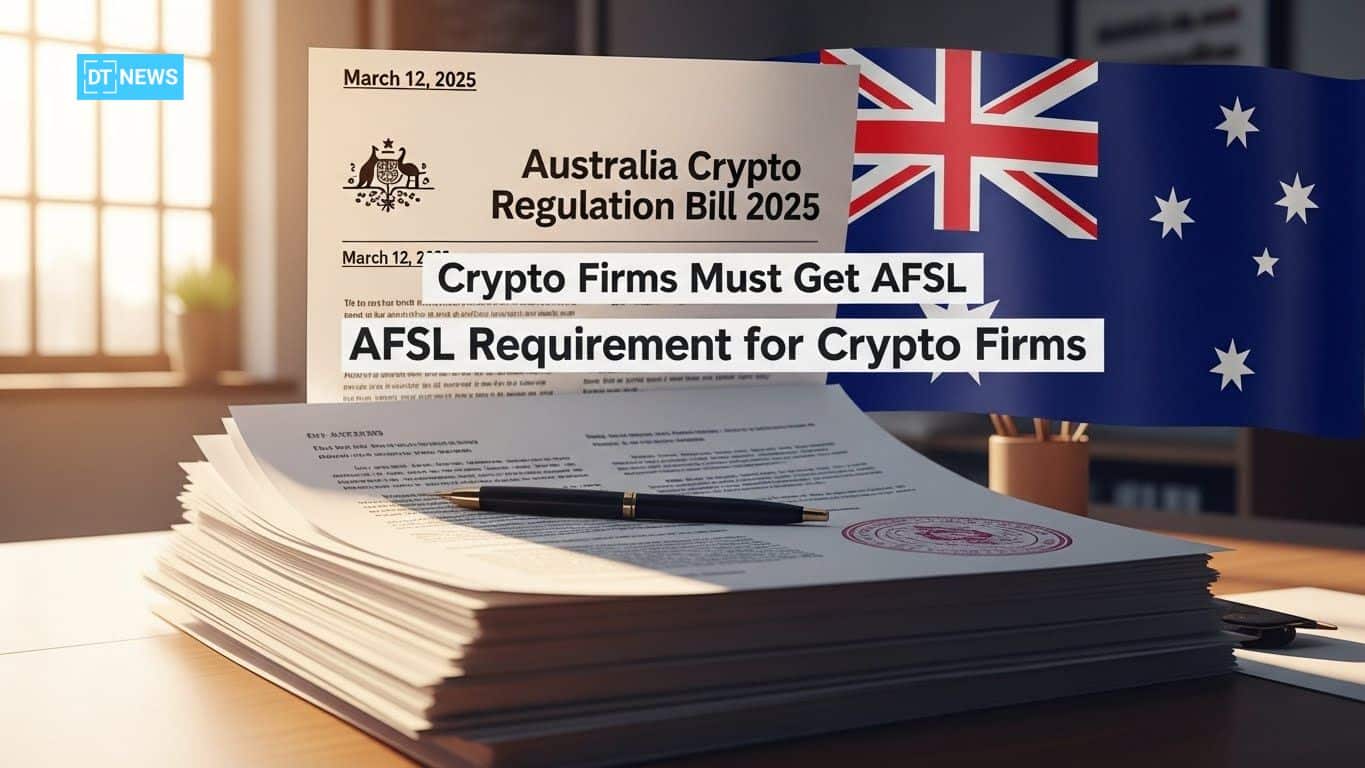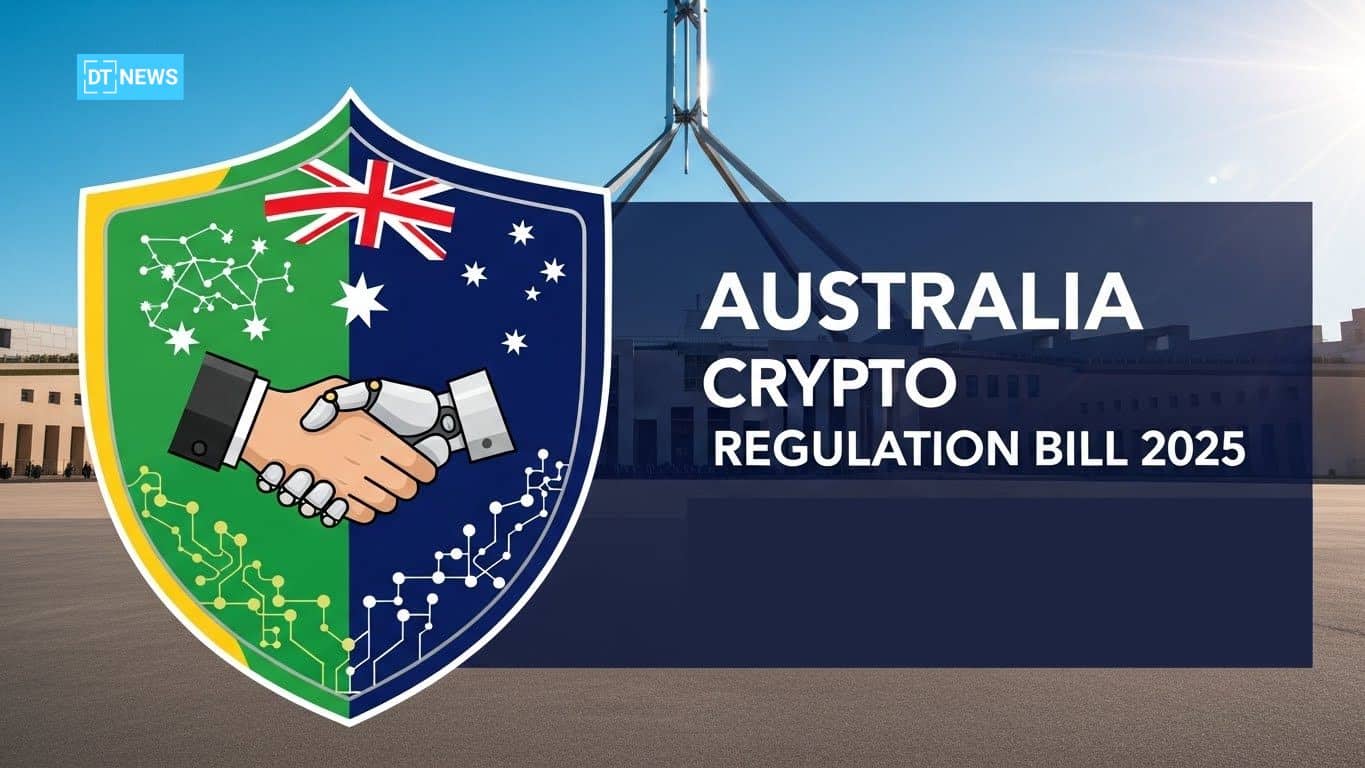This article was first published on Deythere.
- Why the Bill Finally Passed: Covering Legal Loopholes
- What the Bill Does: Licensing, Kinds of Licenses and Compliance Standards
- How the Crypto Industry and Finance Sector Are Responding
- Conclusion
- Glossary
- Frequently Asked Questions About Australia Crypto Regulation
- What is the biggest change to the new Australia crypto bill?
- On whom does the regulation have effect?
- When will the new bill be in place?
- Why did Australia enact this regulatory regime now?
- References
Australia’s federal government finally moved to firmly tie the country’s crypto industry in with traditional finance under a single body of law.
The new bill, titled The Corporations Amendment (Digital Assets Framework), Bill 2025, seeks to mandate that all crypto exchanges and custody service providers become “officially licensed” with the Australian Financial Services Licence (AFSL) and adhere to existing financial services regulatory standards.
The action is among a suite of regulatory reforms designed to modernize Australia crypto laws, ensure stronger consumer protections and bring crypto operations into global financial norms.
Although it has created excitement among many parties, the bill itself does represent a change to how crypto companies will do business in the country.
Why the Bill Finally Passed: Covering Legal Loopholes
Australia’s digital-asset ecosystem has grown quickly, but until now, a number of crypto platforms have operated with little supervision.
According to the government, some firms had no limits on the amounts of customer crypto they held “without any financial law safeguards,” allowing room for fraud, mismanagement and systemic risk, especially after high-profile collapses around the world.
The new bill expands on a consultation initiated by the Treasury in early 2025 and recognizes that digital assets, such as cryptocurrencies, tokenized real-world assets, stablecoins and custody services, are increasingly serving similar functions to more conventional financial products.

Rather, the logic behind the legislation is to treat service providers as financial intermediaries, not the blockchains themselves, whenever they hold or control assets on behalf of clients.
Speaking in the parliament, Assistant Treasurer Daniel Mulino said the changes are needed to ensure Australia is “keeping up” with movements in global finance.
The bill is intended to encourage investment and creativity while protecting users.
What the Bill Does: Licensing, Kinds of Licenses and Compliance Standards
Two new subsects of regulated financial products are established under the law: a “digital asset platform” (DAP) and a “tokenized custody platform” (TCP). Any business structured as either must have an Australian Financial Services Licence.
That means that crypto firms will have to meet obligations similar to those applied to banks and investment companies.
These involve operating in an efficient, honest, and fair way, providing disclosures to customers with clear details of how their assets are held and managed, robust governance structures as well as risk management arrangements, and having availability for customers’ dispute resolution or compensation.
The bill also presents a realistic path to implementation; there’s an 18-month grace period in which current platforms can apply for licensing and ready themselves for compliance.
Crucially, not all firms will be ensnared by the law. The bill provides exemptions for small or low-volume operators, those who hold less than A$5,000 (US$3,263) of a customer’s money and conduct under A$10 million (US$6.5 million) in transactions annually.
How the Crypto Industry and Finance Sector Are Responding
Mainstream financial establishments and industry bodies have mostly given an initial good reception to the exposure draft.
The Australian Banking Association (ABA) reportedly welcomed the development, assuring that it fills regulatory loopholes and puts digital-asset businesses under a strong regulatory framework.

Industry participants largely concur that clearer guidelines and oversight will help boost investor confidence, promote genuine investment and deter bad operators, a change that is expected to bring more institutional capital into Australia’s crypto sector.
Other smaller crypto wallets and exchanges, however, fear the compliance costs, licensing obligations and threat of being forced out of business if unable to meet the new thresholds.
The exemption clause could protect some but not all smaller businesses.
Conclusion
With the approval of the Digital Assets Framework Bill 2025, Australia has made history in its stride towards incorporating crypto platforms into traditional finance services.
By mandating an Australian Financial Services Licence and establishing clear compliance obligations, the government has said it is moving from laissez-faire to regulated inclusion.
The new scheme provides better safeguards for consumers, promotes clearer information and creates a more stable footing for innovation around digital assets.
While it puts pressure on existing providers and particularly smaller ones, the result in the long term may be a more reliable and developed Australian crypto ecosystem following international standards.
Glossary
Digital asset platforms (DAP): A service provider that manages or trades digital tokens (such as crypto) for clients.
Tokenized Custody Platform (TCP): A business that custody crypto/digital assets for clients; will also need to hold an AFSL under the bill.
AFSL (Australian Financial Services Licence): Formal licence needed to provide financial services in Australia, which now also applies to regulated crypto platforms.
Exemption thresholds: Standards based on small or low volume platforms and under which a platform may operate without licensure (e.g. low per-client assets and transaction volume)
Frequently Asked Questions About Australia Crypto Regulation
What is the biggest change to the new Australia crypto bill?
Crypto platforms such as trading exchanges and the firms that provide custody of digital assets will now need an Australian Financial Services Licence (AFSL), if they are dealing with clients’ crypto funds, essentially placing them in the same camp as traditional financial-service providers.
On whom does the regulation have effect?
Operators that are classified as digital-asset platforms (DAPs) or tokenized custody platforms (TCPs). Small players, however, depending on transaction volume or per-client holdings size may be free from these obligations.
When will the new bill be in place?
The bill features an 18-month transition period during which time existing operators can apply for licences and meet responsibilities.
Why did Australia enact this regulatory regime now?
To fill the current gaps in public policy and regulation, ensure robust consumer protections, curb abuses, prevent fraud and manipulation.



















































































































